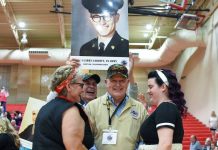A college junior was listening to the radio in his Indiana University fraternity house when he heard about the Dec. 7, 1941, attack on Pearl Harbor.
The news caught Robert Kirk, then 19, off guard.
“I wasn’t expecting it from that direction,” said Kirk, now 94.
But since war efforts already had begun in Europe, it was just a matter of time before the United States got involved, he said.
Kirk was involved with advanced Reserve Officers’ Training Corps at Indiana, a year away from completing college with a degree in finance.
After graduation, the Bloomington native decided to step up and serve his country.
While Kirk said he and others weren’t eager to go to war, “we realized that was the responsibility we had to do.”
Kirk entered the military in 1943. He was commissioned in the U.S. Army at Fort Benning, Georgia, before training for the 69th Infantry Division at Camp Shelby in Mississippi, where he met his late wife, Marjorie.
Kirk received pilot training, eventually receiving his wings in Georgia, and expected to be a bomber pilot overseas. Kirk also went to Mountain Home, Idaho, where he was involved in crew training.
Sixteen crew members from that base were sent overseas, but Kirk was among 16 others sent to Langley Field in Virginia — to train others in low-altitude bombing by radar.
Kirk said he had orders to fly into China via Africa, but they were short-lived — canceled the next morning, he said.
He eventually was sent back to Langley Field before heading to Tarrant County Air Force Base, in Fort Worth, Texas, for more B-32 bomber training. But with the war’s 1945 ending, Kirk was never sent overseas.
His World War II legacy would be to prepare others for such assignments.
Kirk moved to the National Guard in his hometown of Bloomington as a liaison pilot, a position that was eventually eliminated. He became an administrative assistant in the guard before retiring in 1965 as a major after 20 years in the Air Reserve.
He married Marjorie and bought a home in Bloomington on the G.I. Bill and started his family. But in 1953, they moved to Columbus, where he took a position with Irwin Union Bank.
Kirk’s time as a military pilot is represented in photos on the wall of his Parkside Court retirement community home. Several show the various types of aircraft he was involved with, including the B-24 and B-32 bomber planes.
Like others who have served, Kirk said he never really discussed his military service with his family. However, Kirk said he plans to give his pilot wings to his grandchildren.
Kirk described his experience in the military as one that allowed him to meet different people from across the country.
Kirk said times have changed in the 75 years since Pearl Harbor, however.
“It’s a different attitude,” he said. “It seems to me that too many young people expect everything to be given to them.”
Kirk said he believes providing service in the United States is something important, and encouraged young people to do their part.
“Don’t wait for someone else to do it for you,” he said.
[sc:pullout-title pullout-title=”Robert Kirk” ][sc:pullout-text-begin]
Name: Robert Kirk
Age: 94
Branch of service: Army (served as infantry officer, an Army Air Forces officer and an artillery officer), National Guard
Dates of service: 1943-1965, including 20 years of National Guard Reserve service
Where he grew up: Bloomington
Family: Two sons, John of Columbus, and Robert (deceased); a daughter, Judith, who died shortly after birth; and his late wife, Marjorie. Robert Kirk is grandfather to three grandchildren and one great-grandchild
Where he lives now: Parkside Court retirement community in Columbus
[sc:pullout-text-end]




